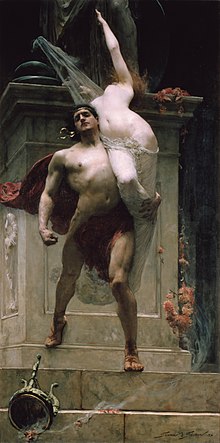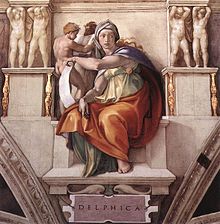Cassandra
In Greek mythology, Cassandra (in ancient Greek, Κασσάνδρα: "the one who entangles men" or "sister of men") was the daughter of Hecuba and Priam, kings of Troy. Ella Cassandra was a priestess of Apollo, with whom she agreed, in exchange for a carnal encounter, the granting of the gift of prophecy. However, when she agreed to the arcana of divination, Cassandra rejected the love of the god; The latter, seeing himself betrayed by her, cursed her by spitting in her mouth: she would continue to have her gift, but no one would ever believe her predictions. Some time later, before her repeated announcement of the imminent fall of Troy, no citizen gave credit to her predictions. She, along with Laocoon, were the only ones who predicted the deception on the Trojan horse.
Myth
Apollo loved Cassandra infinitely, but when she did not reciprocate, he cursed her: his gift would become a continual source of pain and frustration, as no one would believe his predictions. In some versions of this myth, Apollo spits out of her into her mouth when he curses her; in other Greek versions this act usually means the loss of the recently acquired gift, but Cassandra's case is different. In Orestes she promises to Apollo that she will become her consort, but she doesn't keep it, so she unleashes her wrath.
Although Cassandra foresaw the destruction of Troy, the death of Agamemnon, and her own misfortune, she was unable to prevent these tragedies, such was the curse of Apollo. Her family believed she was crazy and, in some versions, they kept her locked up at home or jailed, causing her to go insane. In other versions, she was simply misunderstood.
Once the Trojan War was over, during the sack of the city, Ajax, son of Oileo, found Cassandra sheltering under an altar dedicated to Athena. Although the princess clung to the sacred statue of the goddess, (either it was the Palladium, or another different statue), in the frenzy of looting Ajax ignored the pleas, and dragged her along with the statue. According to some sources, he raped her in that precise place; for other sources, the sacrilege committed by Ajax had consisted of not respecting the sacred statue of the goddess. This fact condemned the warrior, since Poseidon, impelled by the humiliated Athena, sank his ship causing a storm near the promontory of the Giras rocks, where Ajax drowned, or was nailed to the rocks by Poseidon's trident according to another variant of the legend.
Cassandra was given as a concubine to King Agamemnon of Mycenae. He was unaware that while he was fighting in Troy, his wife Clytemnestra had become Aegisthus's lover. When Agamemnon and Cassandra returned to Mycenae, Clytemnestra asked her husband to walk on a purple carpet, the color that symbolizes the gods. Despite the fact that Cassandra repeatedly warned him not to do it, the king ignored her and crossed the carpet, thus committing a sacrilege. Clytemnestra and Aegisthus murdered both. In some versions, Cassandra and Agamemnon had had twins: Teledamus and Pelops. Both were also killed by Aegisthus.
Telephus, son of Heracles, also loved Cassandra. However, she made fun of him and helped him seduce Laodice, Cassandra's sister.
There are alternate versions of the story in which Cassandra, as a child, spent the night in the temple of Apollo with her twin brother Helenus and the temple serpents sucked and cleaned her ears, so that both would be able from then to hear the future. This is a recurring theme in Greek mythology. Other versions suggest that Cassandra got the ability to understand the language of animals, instead of knowing the future.
Modern adaptations
Cassandra appears in Geoffrey Chaucer's fifth book, Troilus and Cressida (Troilus and Criseyde, 1385), as Troilus's sister. He dreams one day that his beloved Crésida is in love with a pig, and he asks Cassandra for advice. She correctly interprets the dream and tells him that Cressida no longer loves him because she now loves Diomedes, a Greek warrior (one of whose ancestors was famous for having killed a gigantic and ferocious boar: the Calydonian Boar). Due to the curse, Troilo does not believe Cassandra.
The myth was also addressed by the German writer Christa Wolf in her work Kassandra. The book tells the story from Cassandra's point of view at the time of her death.
Swedish group ABBA on the song "Cassandra" He talks about a person who regrets not having believed him about her power and makes reference to various points in the myth. The theme was written by Benny Andersson and Björn Ulvaeus and appears on The Visitors (album).
Author Marion Zimmer Bradley wrote a historical fantasy novel called The Torch (1987) that retells the Iliad, also from Cassandra's point of view.
In Markus Sedwick's novel The Foreshadowing, Alexandra, the main character, has the gift of seeing into the future, although she mainly sees the death and suffering of others. Also, growing up in World War I England, her power is feared and questioned. In the novel, she reads the myth of Cassandra and realizes the parallelism with her own existence.
In Eric Shanower's Age of Bronze: Sacrifice, Cassandra is raped as a child by an evil priest who pretends to be a god.
In Clemence McLearn's novel Inside the Walls of Troy, Cassandra has a close friendship with Queen Helen of Sparta when she arrived in Troy with Prince Paris. Cassandra hated Helena with all her soul, but she surrendered to her continued joy and happiness and became her confidante. At the end of the story, Cassandra is not raped or goes off with Agamemnon. She simply stays with her sisters Polyxena and Laodice in Athena's temple. The rest of the story is not told.
In modern literature, Cassandra is often used as a model for tragedy and romance, and often symbolizes the archetype of someone whose prophetic vision is obscured by madness, turning her revelations into tales or disjointed statements that are not fully understood until that the predicted happens.
Cassandra syndrome is a fictional concept used to describe someone who believes they can see the future, but can do nothing to prevent it. For example, in the movie Twelve Monkeys. Dr. Kathryn Railly researches this syndrome and those who suffer from it.
In Woody Allen's film Mighty Aphrodite, Cassandra appears as one of the characters, warning the protagonist of his bad future.
The Argentine writer Roberto Mateo, in his novel La impronta de Casandra, takes the original idea of the myth and modifies it by giving it other nuances; As an example, Apollo not only gives her the power to predict the future but, at her own request, she also receives the gift of immortality, the gift of the right word, and the wish to become a protector of word artists.. With this twist on the original myth, the author of this novel manages to bring Cassandra up to the present time, generating encounters throughout history with writers who at some point in her work mention her; Through this historical walk, Cassandra meets, influences and supports Euripides, Aeschylus, Schiller and Rossetti, as well as the central character of this novel, whom she ultimately knows.
The Spanish poet Ernesto Filardi deals with the myth of Cassandra in the homonymous piece from the collection of poems Penult moment (Madrid, Sial, 2005). In the poem an identification of Troy with a finished love relationship is established, while Cassandra identifies with the beloved who for some time already announced that the relationship had no future.
The gothic metal group Theater of Tragedy has Cassandra as the protagonist of the first cut of their album Aégis.
The Argentine rock group from the 70s Sui Generis dedicates a song to the myth of Cassandra entitled The one-eyed and the blind. Charly García is its author and appears for the first time on the album Small anecdotes about institutions, released in 1974.
In 2007, the Spanish singer-songwriter Ismael Serrano composed a song called Casandra for his album Sueños de un hombre despierto. Likewise, the Canarian composer Pedro Guerra composed a song with the same title.
The German power metal band Blind Guardian dedicated the songs Under the ice to him, which narrates his death, and And then there was silence, where he talks about Cassandra's visions of the Trojan War. Both songs are included on the 2002 album A night at the Opera
In 2013, the Mexican playwright Silvia Peláez wrote her play Visiones o el complejo de Casandra, in which the protagonist is a television journalist, an environmentalist, who has the power to predict terrible events but no one takes her into account, until, pressured to raise the program's audience rating, she performs a limit action in front of the cameras. The author draws a parallel between the journalist's boss with Apollo, and her co-worker, Ayante, with Ajax. In a first version, the work was presented in a dramatized reading at the La Gruta Theater of the Hellenic Cultural Center in 2013.
In the 2020 series Cosmos: possible worlds, the myth of Cassandra is recounted in the episode 1x12 Coming of Age In The Anthropocene.
Cassandra is a major character in the 1998 Disney animated series Hercules. She is a close friend of both Hercules and Icarus. She has constant visions of the future, usually disasters and is unable to avoid them, because she is shown as a gloomy and sarcastic character, which is why Hercules and Icarus do not usually take her predictions seriously.
Contenido relacionado
Triskaidekaphobia
Pegasus
Hephaestus



